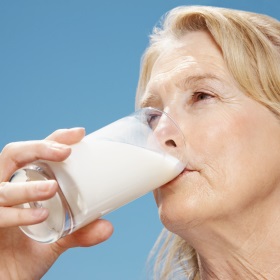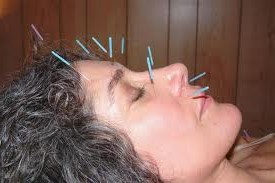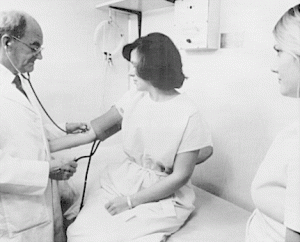Just two states, Massachusetts and Connecticut, received A's in all three categories. Twelve states received D or F in all three categories. Our WHRI home state of Illinois received an overall B rating. The entire report is available from the Alliance website. To just view the table chart for all fifty states, click Here.
 The average age of menopause in the United States is around 51 years old, but the onset can widely vary. Premature menopause refers to menopause of onset at or before 40 years of age. This can occur because of a variety of causes, including surgery (i.e. bilateral oophorectomy, removal of ovaries), chemotherapy or pelvic radiation treatments for cancer, chromosomal or genetic defects, and spontaneous premature ovarian failure.
The average age of menopause in the United States is around 51 years old, but the onset can widely vary. Premature menopause refers to menopause of onset at or before 40 years of age. This can occur because of a variety of causes, including surgery (i.e. bilateral oophorectomy, removal of ovaries), chemotherapy or pelvic radiation treatments for cancer, chromosomal or genetic defects, and spontaneous premature ovarian failure.
A study based on a sample of 4868 women tested cognition at baseline, two, four, and seven years, and it also looked at the effects of the type of menopause, whether natural or surgical, could play a role.
Natural menopause was reported by 79% of the 4868 participants, 10% underwent menopause from surgical causes, and 11% reported menopause from other treatment causes including radiation or chemotherapy. Approximately 7.6% of the women in the study had a premature menopause, and the study further delineated 12.8% of the women had an early menopause (between 41 and 45 years of age).
Results showed that women who underwent premature menopause had a more than 40% increased risk of poor performance on verbal fluency and visual memory tasks, compared to those who experienced menopause at or after the age of 50. Women who underwent premature menopause also were associated with a 35% increased risk of decline in psychomotor speed. There was no significant association with the risk of dementia.
Both premature menopause secondary to surgery and premature ovarian failure, were associated with long-term negative effects on cognitive function, which cannot entirely be answered by hormone therapy. Researchers agree more studying needs to be done to better understand the potential benefits using hormone therapy.
Healthcare professionals should be aware of the potentially significant impact premature menopause can have on cognitive function in later life. Professionals should also consider these effects when aiding younger women in the decision-making process of undergoing oophorectomy. To learn more about how menopause can affect you long-term, visit Northwestern's menopause website here.
Source: J Ryan, J Scali, I Carrière, H Amieva, O Rouaud, C Berr, K Ritchie, M-L Ancelin.Impact of a premature menopause on cognitive function in later life. BJOG: An International Journal of Obstetrics & Gynaecology, 2014; DOI: 10.1111/1471-0528.12828
 Loss of bladder control, or urinary incontinence, is a problem that millions of women face. The involuntary loss of urine can range in presentation; it can be minimal, from a few drops when you laugh, exercise, or cough. Or, it can be an accident when you suddenly urge to urinate and can't keep it in. Most episodes of urinary incontinence are the result of altered pressures or stress on the muscles and nerves that help you pass or hold urine in. Hormone changes can also affect muscle strength. Like your vaginal tissue, the muscle tissue in and surrounding the bladder and urethra (the short tube that passes urine from the bladder out the body) requires estrogen to remain supple and strong. When estrogen levels drop in menopause, the tissue around the bladder and urethra thin and weaken,which can lead to incontinence.
Loss of bladder control, or urinary incontinence, is a problem that millions of women face. The involuntary loss of urine can range in presentation; it can be minimal, from a few drops when you laugh, exercise, or cough. Or, it can be an accident when you suddenly urge to urinate and can't keep it in. Most episodes of urinary incontinence are the result of altered pressures or stress on the muscles and nerves that help you pass or hold urine in. Hormone changes can also affect muscle strength. Like your vaginal tissue, the muscle tissue in and surrounding the bladder and urethra (the short tube that passes urine from the bladder out the body) requires estrogen to remain supple and strong. When estrogen levels drop in menopause, the tissue around the bladder and urethra thin and weaken,which can lead to incontinence.
The most common types of urinary incontinence include stress incontinence and urge incontinence. Stress incontinence occurs when the pressures from activities such as laughing, coughing, and sneezing cause leakage. Urge incontinence occurs when you have the urge to urinate and your bladder squeezes at the wrong time. Often, these two types can create a mixed picture. Other bladder problems that can happen are nocturia, when you must wake up multiple times throughout the night to urinate, and dysuria, painful urination.
If you think you have incontinence, visit a professional to learn more about the variety of options you have for treatment. A professional can be your primary care physician, gynecologist, urologist, and even a urogynecologist. Your physician may recommend lifestyle changes such as limiting alcohol or caffeine intake, recording a voiding diary, or strengthening your pelvic floor muscles with Kegel exercises. Beyond this, therapies also include devices inserted into the vagina to hold up the bladder (pessaries), a variety of medications, and surgery if necessary. Your physician will also be the one to exclude other potential causes of bladder problems including infection and neurological damage.
To learn more about urinary issues or other symptomatology that arise during menopause, visit Northwestern's menopause website here.
 Drinking milk is not just for kids but also for post-menopausal women, new research shows. A new study from the Women's Health Initiative just published by the North American Menopause Society, reveals that calcium and vitamin D after menopause can improve women's cholesterol profiles.
Drinking milk is not just for kids but also for post-menopausal women, new research shows. A new study from the Women's Health Initiative just published by the North American Menopause Society, reveals that calcium and vitamin D after menopause can improve women's cholesterol profiles.
Over 600 women took either a supplement containing 1,000 mg of calcium and 400 IU of vitamin D3, or a placebo, daily. Women who took the supplement, unsurprisingly, were two times more likely to have sufficient vitamin D levels (at least 30 ng/mL), in comparison to the women were taking placebo. Women who were taking supplements also had LDL (the "bad" cholesterol) numbers that were 4 to 5 points lower than the women taking placebo. The women on supplement also had higher levels of HDL (the "good" cholesterol) and lower levels of triglycerides.
Researchers agree that more work needs to be done to see whether or not supplementing one's diet with calcium and vitamin D can lower cholesterol levels and ultimately improve rates of cardiovascular disease in women after menopause. These results, however, show that there may potentially be extra benefits for those with calcium and vitamin D deficiencies to start supplements. Supplementing may be key for strengthening both the heart and bones after menopause. To learn more about healthy choices you can make after menopause, visit Northwestern's menopause website here.
“Calcium/vitamin D supplementation, serum 25-hydroxyvitamin D concentrations, and cholesterol profiles in the Women’s Health Initiative calcium/vitamin D randomized trial,” will be published in the August 2014 print edition of Menopause.
![]() Prentice Women’s Hospital: Under the Northwestern Memorial Hospital Chicago, was recently named one of the top ten women's health providers by HealthCare Global Magazine. It was noted that the hospital provides a wide variety of services and specialized care just for women, through all stages of their lives- from gynecologic and pregnancy care to menopause and bone health. The Women's Health Research Institute has worked with Prentice on several programs including:
Prentice Women’s Hospital: Under the Northwestern Memorial Hospital Chicago, was recently named one of the top ten women's health providers by HealthCare Global Magazine. It was noted that the hospital provides a wide variety of services and specialized care just for women, through all stages of their lives- from gynecologic and pregnancy care to menopause and bone health. The Women's Health Research Institute has worked with Prentice on several programs including:
- Advocacy and promotion of specialty clinics in neurology, depression, cardiology, skin health, sleep disorders, and pelvic health that are described HERE
- The creation of an interactive menopause website that provides the latest options for menopause symptom management.
- Provided professional education on sex differences beyond reproductive and maternal health.
To learn about the entire top ten, visit Healthcare Global.
![]() U.S. News & World Report recently released the 2015 rankings of top medical schools, and we're proud to announce that the Women’s Health program at Northwestern University Feinberg School of Medicine is now ranked #10 (up one spot from #11 in 2014) among medical schools nationally. This designation looks at the educational, clinical and research aspects of women's health and goes beyond gynecology to include maternal health and endocrine issues. The Women's Health Research Institute at NU with its motto "science to care" works closely with all our clinical and research departments to embed sex based research and care throughout the institution.
U.S. News & World Report recently released the 2015 rankings of top medical schools, and we're proud to announce that the Women’s Health program at Northwestern University Feinberg School of Medicine is now ranked #10 (up one spot from #11 in 2014) among medical schools nationally. This designation looks at the educational, clinical and research aspects of women's health and goes beyond gynecology to include maternal health and endocrine issues. The Women's Health Research Institute at NU with its motto "science to care" works closely with all our clinical and research departments to embed sex based research and care throughout the institution.
You can view the top Women’s Health programs here: http://grad-schools.usnews.rankingsandreviews.com/best-graduate-schools/...
 Acupuncture has been used in Eastern countries to address women's health issues but is not readily adopted in the U.S. especially by the medical establishment. A new study reports preliminary data indicating that acupuncture may improve menstrual health and overcome delays in becoming pregnant. There are experimental data indicating that acupuncture can influence female reproductive functioning, although the actual mechanisms involved are not yet clarified. Acupuncture is a complex intervention yet the evaluation of acupuncture research designs and outcome measures expect a level of commensurability difficult to achieve in complex interventions. A focus on effectiveness rather than efficacy may be a solution. Further research is needed that includes the rich traditions of acupuncture practice and the rigorous methods of evidence-based research.
Acupuncture has been used in Eastern countries to address women's health issues but is not readily adopted in the U.S. especially by the medical establishment. A new study reports preliminary data indicating that acupuncture may improve menstrual health and overcome delays in becoming pregnant. There are experimental data indicating that acupuncture can influence female reproductive functioning, although the actual mechanisms involved are not yet clarified. Acupuncture is a complex intervention yet the evaluation of acupuncture research designs and outcome measures expect a level of commensurability difficult to achieve in complex interventions. A focus on effectiveness rather than efficacy may be a solution. Further research is needed that includes the rich traditions of acupuncture practice and the rigorous methods of evidence-based research.
Source: International Journal of Women's Health 17 March 2014.
 New research proves yet another reason for women to quit smoking: smoking may cause earlier signs of menopause. Heavier smokers may enter menopause up to nine years earlier compared to nonsmokers.
New research proves yet another reason for women to quit smoking: smoking may cause earlier signs of menopause. Heavier smokers may enter menopause up to nine years earlier compared to nonsmokers.
In the United States, the average age for menopause is 51. Previous studies have already showed that smoking can hasten menopause by one to two years, regardless of race or genetic background. New research shows that menopause can happen much quicker specifically in white female smokers who are carriers of two different gene variants.
Over 400 women ages 35 to 47 from the Penn Ovarian Aging Study were compared. Heavy smokers, light smokers, and nonsmokers who were carriers of the CYP3A4*1B variation had an average time-to-menopause of 5.09 years, 11.36 years, and 13.91 years, respectively, after entering the study. This suggests that certain white females with a specific genetic make-up may enter menopause up to nine years earlier than nonsmoking females.
The average time-to-menopause for white carriers of the CYP1B1*3 variation, was 10.41 years, 10.42 years, and 11.08 years among heavy smokers, light smokers, and nonsmokers, respectively. The results were statistically significant but the discrepancies were obviously not as huge as the CYp3A4*1B variant.
 New long-term research shows that hot flashes continue, on average, for five years after menopause. More than a third of women can experience hot flashes for up to ten or more years after menopause.
New long-term research shows that hot flashes continue, on average, for five years after menopause. More than a third of women can experience hot flashes for up to ten or more years after menopause.
A recent study evaluated 255 women in the Penn Ovarian Aging Study who reached natural menopause over a 16-year period. The results indicate that 80 percent reported moderate to severe hot flashes, 17 percent had only mild hot flashes, and three percent reported no hot flashes.
Hot flashes are momentary episodes of heat that can occur with other symptoms including sweating and flushing. Changing hormone levels after cessation of menses are believed to cause hot flashes as well as other menopausal symptoms including insomnia, anxiety, joint and muscle pain, and memory problems. Hormone therapy repletes the hormones estrogen and progesterone the body stops making during menopause, and it has been proven an effective treatment for hot flashes.
Although hormone therapy is highly effective, it is not recommended for all women. In addition, concerns about health hazards linked to hormone therapy have made some physicians hesitant to prescribe it, or to adhere strictly to recommended duration guidelines; current guidelines suggest that exogenous hormones should not be taken for more than five years. This new research on the long-term persistence of hot flashes suggests that women should collaborate with their physicians to determine the risks and benefits of different hormonal and nonhormone therapies available for menopausal symptoms. Women should be able to individualize their treatment to appropriately minimize the the symptoms they may have, no matter how severe or how persistent. To learn more about the variety of treatments available for menopausal symptoms, visit Northwestern's Menopause website here
Source: Ellen W. Freeman, Mary D. Sammel, Richard J. Sanders. Risk of long-term hot flashes after natural menopause. Menopause, 2014; 1 DOI:10.1097/GME.0000000000000196
 This month marks the 41st anniversary of Roe v. Wade, the pivotal case where the United States Supreme Court legalized abortion. Many see this decision as both a political and religious issue, while others view this as the right for women to make private medical decisions without the interference of politics. Regardless of how you view abortion, it’s important to recognize the evolution of women’s health in America to see how far we’ve come in this field.
This month marks the 41st anniversary of Roe v. Wade, the pivotal case where the United States Supreme Court legalized abortion. Many see this decision as both a political and religious issue, while others view this as the right for women to make private medical decisions without the interference of politics. Regardless of how you view abortion, it’s important to recognize the evolution of women’s health in America to see how far we’ve come in this field.
Here is a brief timeline outlining notable events in women’s health in the United States.
1800: This year, every American woman had an average of seven children over her lifespan. The birthrate reached an all-time high of 55 births per thousand residents—today the rate is 13 births per thousand.
1849: Elizabeth Blackwell ranked first in her class at New York’s Geneva Medical College, making her our country’s first female doctor. Battling sexism and prejudice, Blackwell founded a small clinic that eventually grew into the New York Infirmary for Women and Children and even opened the Women’s Medical College in 1868 to train more female physicians.
1896: The first commercial menstrual care product in America came on the market from a “little known” company called Johnson & Johnson. Unfortunately, this model was a commercial failure and it wasn't until 1921, with the invention of Kotex, that menstrual care products found their market success.
1916: Margaret Sanger opened America’s first birth control clinic in Brooklyn, New York. Later, in 1921, she founded the American Birth Control League, which was eventually called Planned Parenthood.
1931: Robert Tilden Frank, a New York gynecologist, became the first researcher to give medical credence to premenstrual syndrome.
1960: The FDA approved the sale of the birth control pill, the first oral contraceptive manufactured by Searle.
1969: The low-radiation mammogram was invented, minimizing the risk of high doses of radiation on earlier models.
1970: The publishing of Our Bodies, Ourselves revolutionized views about the female body and sexuality. It is a book written by women, for women, and has sold more than 4 million copies since its publication.
1973: Roe v. Wade decision made by the United States Supreme Court.
2006: The FDA approved the emergency contraceptive pill Plan B for prescription use. It is now sold over-the-counter for women 18 and older.
2007: Dr. Teresa Woodruff edits the first book on oncofertility, a new field that studies how to preserve fertility in patients whose fertility has been compromised due to cancer treatment.
Of course we know that women's health extends well beyond these notable triumphs, and we're looking forward to a future where innovative advances in women's health continue to become more frequent and groundbreaking.
Source: Everyday Health

 The
The